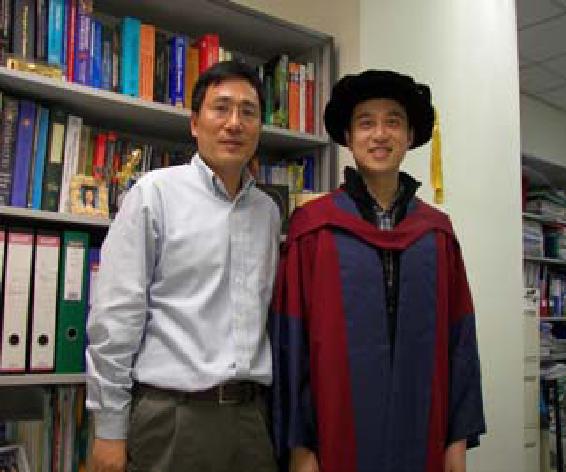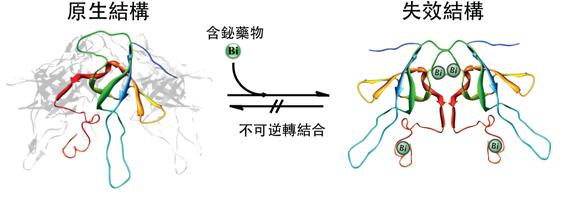Media
Back
HKU Scientists’ Research on Metalloproteins Seeks to Inhibit Mutation of Helicobacter Pylori
05 Mar 2010
|
During the battle with human, pathogens usually mutate rapidly to make drugs lose their target, for which many new drugs are ineffective soon after clinical application. Researchers at the Department of Chemistry of The University of Hong Kong carried out a comprehensive study on exploring new drug targets against bacterial infection. With the use of modern biology approach, they found that metal complexes, especially unnatural metals such as bismuth, compounds could play a useful role in the susceptibility of a pathogen, restricting the mutation of Helicobacter pylori and inhibiting bacterial growth. Their work has been published in the renowned Proceedings of National Academy of Sciences of the United States of America (PNAS) in early March, 2010. There is an urgent need to discover new approaches for the design of novel antibiotics. On one hand, metal-based antibiotics hold promise as they can effectively interfere with the metal-protein interaction of the bugs. On the other hand, bacteria are becoming more resistant to existing organic antibiotics. Despite the wide adoption of antibiotics, scientists have to understand how they work so that their designs can be improved. Recently, Professor Hongzhe Sun and Dr Shujian Cun from the Department of Chemistry of HKU, have used a chemical biology and metallomics approach to investigate Helicobacter pylori, a virulent gastric pathogen. They found a rare mutation of its indispensible protein, GroES: a zinc-binding site at the roof of the protein, which might have derived from negative selection. Their experiments demonstrated a strong bond of the bismuth antiulcer drugs at this site, replacing the original zinc, disrupting the protein structure, and inhibiting the bacterial growth. In general, the biological features of negative selection are usually inert to change. Thus, this work reveals a promising way to develop novel drugs by inhibiting unique characters of the pathogen, not only to cure infection, but to retard drug resistance as well. Professor Sun and his team have worked on ‘metals in biology and medicine'for over ten years, exploring the frontier of inorganic chemistry and chemical biology. They intend to apply the findings to relevant research on other pathogens in near future, so as to verify if negatively selected traits exist in bugs universally. Hopefully, their work will help to design or improve current drugs by retarding drug resistance, and that human may stand a better chance to defeat infectious diseases. The research on metalloproteins is a part of an on-going project supported by the Research Grants Council of HKSAR under the ‘collaborative research fund' scheme. Professor Sun has previously cooperated with the Li Ka Shing Faculty of Medicine to discover potent inhibitors against the virus causing Severe Acute Respiratory Syndrome (SARS). The clinically used drug targets a metal-binding site of a viral enzyme, breaking the DNA replication, thus helping to control the growth of disease. For press enquiry, please contact Ms. Cindy Chan, Communication Manager of Faculty of Science, at 2241-5286/6356-5626 or by e-mail at cindycst@hkucc.hku.hk . About Proceedings of the National Academy of Sciences of the United States of America Proceedings of the National Academy of Sciences of the United States of America (PNAS) is the official journal of the National Academy of Sciences (USA). Founded in 1915, the journal weekly publishes worldwide reports, commentaries and reviews, covering multiple disciplines including biology, physics, mathematics, social sciences and so on. About Negative Selection Biological molecules mutate by random during evolution. When a mutation results in unfitted functions, it will be eliminated from the offspring by natural selection, which is called negative selection. However, under certain conditions, a few organisms such as parasites, might make use of the unusual physiological properties introduced by the mutation to adapt their particular living environment. |
 Professor Hongzhe Sun and Dr Shujian Cun from the Department of Chemistry of HKU  Structural disruption of the pathogenic protein by the bismuth compound |
